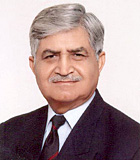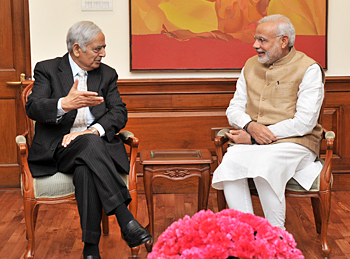INDIAN ARMED FORCES CHIEFS ON
OUR RELENTLESS AND FOCUSED PUBLISHING EFFORTS

SP Guide Publications puts forth a well compiled articulation of issues, pursuits and accomplishments of the Indian Army, over the years

I am confident that SP Guide Publications would continue to inform, inspire and influence.

My compliments to SP Guide Publications for informative and credible reportage on contemporary aerospace issues over the past six decades.
- Interim Defence Budget 2024-25 — An Analysis
- Union Defence budget 2024
- Indian Army: In quest of greater firepower and policy recommendations for gaps
- Indian Army Annual Press Conference 2024
- 6G will transform military-industrial applications
- Tata Boeing Aerospace Delivers 250 AH-64 Apache Fuselages, Manufactured in India
The PDP-BJP Coalition in J&K
 |
By General V.P. Malik (Retd) Former Chief of the Army Staff |

Shri Narendra Modi, in New Delhi on February 27, 2015.
J&K with its diverse topography, culture, religion, linguistic and ethnic identities has represented a truly pluralistic landscape of India. Alas! That is not true anymore. With Sufism and Kashmiriyat gone, the unreal demand for azadi by a group of Kashmiris, Pakistan sponsored militancy, and our own short sighted politics and poor governance have managed to polarize the state.
This was so evident in the last State assembly elections. Following a 'Modi wave' and earlier election successes, the BJP was able to decimate the Congress, NC and PDP in the Hindu dominated Jammu region. In the Muslim dominated Kashmir Valley, the PDP trounced the NC on the basis of poor governance. But in a common agenda, both parties succeeded publically to keep the BJP out. The fractured and indecisive election result was primarily due to geographical, communal and political polarization which had been going on for decades.
It is well known that both the PDP and BJP have always represented uncompromising core ideologies and displayed little common ground. The PDP has been soft on the Kashmiri separatists; BJP strong in anti separatists and Kashmiri grandstanding and rhetoric. Their decision to form a joint government in J&K has given a strong impression of 'political self interest' to their opponents. Most people are sceptical of their ability to work together in running the State. But if this coalition can provide an inclusive political power structure and effective governance, it would be able to bridge the physical and psychological gap between Jammu and Kashmir regions, and save the State from a possible dismemberment in future. In the national interest, perhaps it could be a risk worth taking!
From the 'Agenda for Alliance', released on 01 March 2015 when they formed the coalition government, it appears that both parties are conscious of these ground realities. The Agenda states, "It is not the mandate of political parties that is fractured; it is the polity of J&K that is fractured...The reality on the ground needs to be faced politically, not numerically."
In the Agenda, both parties seem to have climbed down from much of their hard line manifestos and electoral rhetoric. This includes special status of J&K (Article 370), any immediate decision on the AFSPA, and on 'external' and 'internal' political initiatives and dialogues. Other items mentioned in the Agenda like government reforms and development requirements and so on are non controversial.
Let us deal with the contentious items first.
Two issues often obfuscate perceptions on Article 370. The first is related to the restriction on citizens from outside the State to buy property in J&K. This is not unique to J&K. There are similar provisions for several states which are listed in Article 371 and Articles 371-A to 371-I of the Constitution. The second is about disqualification of women of the State from property rights. There is no direct provision for it in Article 370 and this matter can be easily resolved through administrative or judicial interventions.
In an opposition parties' conclave in Srinagar in 1982, leaders of national parties, including some which form part of the NDA today, had declared that the special constitutional status of J&K under Article 370 should be preserved and protected in letter and spirit. The abrogation demand is less due to restrictions contained in Article 370, more due to regional polarization and prejudices. The relevance of Article 370 is more emotional and less substantive. In the present circumstances, it would be preferable to chip away Article 370, as has been done in the past, instead of pushing for its elimination. 'Erosion' may be a better policy than 'Abrogation'!
As far as 'Disturbed Areas Act' and the AFSPA are concerned, I have always felt that protracted and excessive employment of the army on internal security duties leads to 'laws of diminishing returns'. When deploying the army on such duties, we need to be realistic, austere and flexible. So long as militant camps exist across the LoC/border and cross border infiltration attempts continue, there is no question of removing Disturbed Areas Act and AFSPA in the belt between the LoC/border and about 10-15 km short of it. For other areas, the matter needs to be discussed in the Unified Command which has representatives from all security forces, intelligence agencies and the State Administration and is headed by the Chief Minister. As counter insurgency and terrorism operations have shown substantial improvement in recent years, the army can afford to take some risks and be flexible on the Disturbed Areas Act in peaceful parts of the hinterland. In these areas, the army can be redeployed on the basis of its ability to provide timely assistance to the local police/CPOs. This is what we did in Punjab in early 1990s.
Meanwhile, the security forces must continue with 'zero tolerance' on human rights violations. The AFSPA requires central government's permission to prosecute human rights violators. This should be given if there is any indication of a deliberate crime. (So far, permission has seldom been granted.) I also feel that some more steps can be taken to reduce the Khaki and Olive Green visibility, particularly in urban areas. Their ubiquitous presence in a democratically elected state is jarring. Also, the civil land occupied by the security forces should either be vacated or its owners entitled to compensation, as practised elsewhere.
The dialogue with Pakistan is primarily a Central Government (Ministry of External Affairs) concern. The State Government can convey its cross border related problems and nudge the central government, but it can not be allowed to hijack India-Pakistan relations. A dialogue where Pakistan and the Hurriyat Conference try to sit on the same negotiating table with India can not be accepted.
India and Pakistan do require maintaining ceasefire on the LoC, eliminating cross border terrorism and strengthening confidence building measures. The fact is that India Pakistan dialogue has seldom been without hiccups in the past, and has never been given up for long by the two neighbors. Fresh efforts to resume the dialogue have already begun. The PDP-BJP coalition's shared vision calling for 'enhancing people to people contact on both sides of the LoC, encouraging civil society exchanges, taking travel, commerce, trade and business across the LoC to the next level and opening new routes across all three regions to enhancing connectivity', therefore, is non-controversial. If successful, this will create a conducive environment for faster development of J&K and peace on the sub-continent.
It must also be clear that any political initiative with internal elements like the Hurriyat Conference and other separatists can be a joint effort of the State and the Central Government (Ministry of Home Affairs) only.
Following some unsavory remarks by the Chief Minister Mufti Mohammad Sayeed and issues raised by some PDP workers soon after the swearing-in ceremony, Prime Minster Narendra Modi committed in the Parliament that the PDP-BJP coalition in J&K will work only as per its 'Agenda for Alliance'. Thereafter, on 07 March 2015, the State government allowed Yasin Malik to organize a massive pro azadi rally in Mufti Mohammad Sayeed's own constituency. Next day, it released Musarrat Alam Bhatt, a well known Kashmiri separatist accused of organizing stone-pelting activities in the Valley in 2010-11 in which many people got killed.
Mufti Mohammad Sayeed and his daughter Mehbooba Mufti, who is President of the PDP, have often been accused of practicing 'soft separatism'. There is no doubt that the PDP is under pressure in the Valley after taking a u-turn on its approach to the BJP. But with such quick and questionable actions, have they given a false start to the coalition government? Is the coalition government going to be still born? One wonders how far the PDP will go in running with the hare and hunting with the hounds!
The problem with the PDP-BJP coalition is not the 'Agenda for Alliance' but the mindset and the attitude of the constituents developed over many years and their electoral pronouncements. It is anybody's guess at present on their ability to rule the State jointly. For the sake of people of J&K, one hopes that they would stop squabbling in public and start taking governance seriously. The challenge of governing J&K entails patience, discipline and compromises, and a measure of jostling over the symbolic and the material between the two parties.





